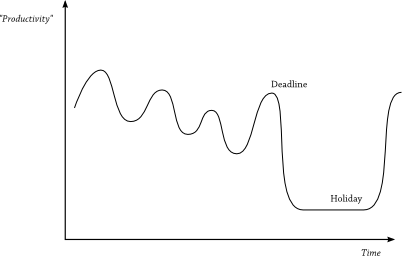Graham’s insight: Maker’s Schedule, Manager’s Schedule
August 20th, 2009 by joseThis single Graham’s post explains more about productivity than most entire blogs on the topic out there. It was a revelation to me. Any day that has more than two non-clustered events becomes wasteful automatically. It’s like your mind can anticipate the futility of trying to get in the zone only to get kicked out of it by a meeting. This also explains why the typical ‘maker’ (a postdoc, or grad student working close to the data) tends to gravitate towards late nights work stunts, whereas professors rarely do. In fact, one big difference between professors and grad students is the number of meetings they have to endure… Can you be a maker and a professor? If so how do you do it?

